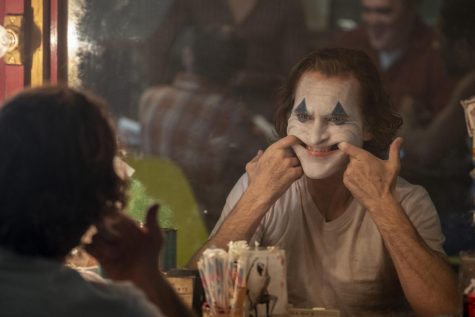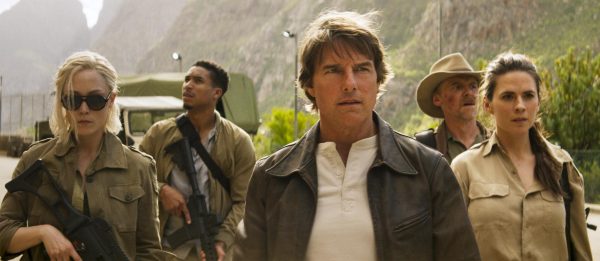Joker: Enjoy the Madness
October 23, 2019
Do you know the movie “Old School?” How about the movie “Starsky and Hutch?” If neither of these ring a bell, I’m sure you’re familiar with “The Hangover” series. So, what could all of these movies possibly have in common with “Joker?” They all share the same director: Todd Phillips. That’s right— Todd Phillips has broken out of pure comedy and has now made a… tragedy?
We open on Arthur Fleck: a man who suffers from mental illness; a man who seeks some— any— form of connection; a man who is brutally antagonized by those around him before he, himself, becomes the antagonizer, and an exceptional one at that.
And who better to play the role than one of the greatest actors of his generation: Joaquin Phoenix. Now, I know you’re thinking (granted, if you’ve seen “The Dark Knight”) that Heath Ledger is the greatest Joker of all time and nobody else will ever top him and they should just discontinue the Joker movies.. I get it. Heath Ledger was a brilliant Joker. But so is Joaquin Phoenix in this movie. Try not to compare. Just be glad that they both exist in their own worlds. Nobody is stepping on anybody. After all, in the comics, Joker mentions that he prefers his past to be “multiple choice.”

Joaquin Phoenix is everything acting is about. He makes me want to be an actor. He makes it fun but also delivers the intensity and uneasiness (the uneasiness consumes you). You’re really never quite sure what’s going to happen next with him. The music, the dancing, all just simply amazing. You don’t even have to like the storyline to appreciate Phoenix’s acting.
The beauty of “Joker” is that it’s a standalone movie. You don’t need to know anything about previous comics or films going into it— to be honest, you don’t need to know who the Joker even is.
The movie doesn’t just start with Joker popping out of some phone booth full-throttle wreaking havoc. Oh, no. It’s a slow burn.
The first half of the movie builds up sympathy for Arthur (product of his environment, brought down by society, mental illness— this sort of thing). Some may call it a bit exaggerated and somewhat far-fetched, but a lot of it in fact reflects society and our own realities. Yes, it is “tricking” you to reason with a maniac, but try not to think of Arthur as already the Joker; he only becomes the Joker. This is not the story of the infamous villain. This is the story of a broken-down man who consistently becomes more and more broken down until he finally gives in and is reborn into what society has forced on him to embrace.
And if you don’t buy the whole “reflecting society” pitch, then just take it for what it is, and what it is, is a movie. And that’s the beauty of a movie— it can do whatever it wants. It’s a fantastical world. Somebody writes it. Somebody films it. And there it is. So hop into the world of the movie and give it a go. There is a purpose for its surreal exaggeration; it’s in place for one little reason you’ll just have to watch the movie and see.
I understand some people don’t like how the movie tries to force the audience into sympathizing for this madman, however at a certain point the threshold snaps and you think to yourself if you really should be sympathizing or not. Where that threshold snaps is different for everyone and is one of many aspects that spark conversation.
The interesting thing about this film is how much is left up in the air to talk about. Is this a tragedy? Or is this a success story? Endless possibilities. Endless theories. Endless interpretations. You could see the movie in a completely different way than the person sitting right beside you. And that’s beautiful. Have fun explaining your interpretation while listening to somebody else’s.
From the very first scene, “comedy vs. tragedy” is a major theme of the movie and it’s pretty remarkable when you think about how similar the two are. Comedians often use their tragedies as material for their comedy. It’s an act. It’s all in the way you frame it. “Joker” delivers the comparison.
Two movies I recommend watching before or after “Joker” are “Taxi Driver” and “The King of Comedy.” Amongst the many reasons why (including the fact that Robert Deniro is in all three of these movies), one reason is that they’re all some of the greatest character study films. Also, “Joker” is very similar to “Taxi Driver” in terms of atmosphere and tone. The rest of the reasons I’ll let you scavenge for.
I said it before and I’ll say it again: “Joker” sparks conversation. And if you don’t watch it, you don’t have an opinion. Don’t just take others’ words for it. Watch it for yourself. Form your own opinion. Enjoy the madness.











